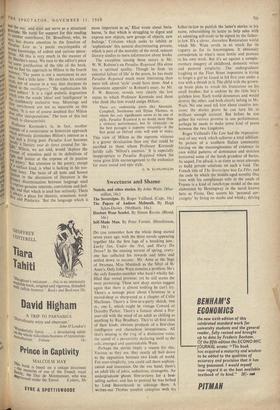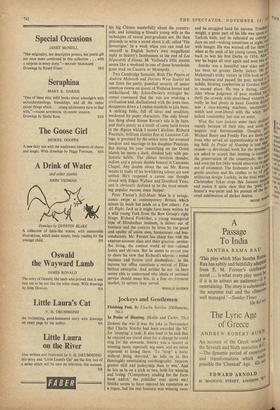Sweetness and Shame
Do you remember how the whole thing started seven years ago, with the three novels appearing together like the first logs of a breaking jam: Lucky Jim, Under the Net, and Hurry On Down? In the ensuing torrent of spring, every- one has collected his rewards and titles and settled down to success: Mr. Amis as the Sage of Swansea, Miss Murdoch as the Sibyl of St. Anne's. Only John Wain remains a problem. He's the only founder-member who hasn't wholly ful- filled that vernal promise; yet he still seems the most promising. These new short stories suggest again that there is almost nothing he can't try. There's a teenage piece about Christmas in a record-shop as sharp-eyed as a chapter of Colin Maclnnes. There's a love-at-a-party sketch, two m., one f., which might be vintage Coward or Dorothy Parker. There's a fantasy about a five- year-old with the mind of an adult as chilling as anything by Ray Bradbury. They're all first class of their kinds, obvious products of a first-class intelligence and chameleon inventiveness. All that's missing is the ring of a distinctive voice, the sound of a personality declaring itself as the sole, emerged and unmistakable Wain.
Perhaps the stories imply -a reason for this. Various as they are, they nearly all boil down to the opposition between two kinds of world. For over-simplicity, you could call them sophisti- cation and innocence. On the one hand, there's an adult life of jokes, seductions, stratagems. An undergraduate ghosts film-reviews for a best- selling author, and has to pretend he was bribed by Lord Beaverbrook to sabotage them. A written-out Thirties novelist conspires with his father-in-law to publish the latter's stories in his name, reburnishing its lustre to help sales with an admiring self-study to be signed by the father- in-law. It's a clever, shameless Restoration world which Mr. Wain revels in as much for its roguery as for its knowingness. It obviously corresponds to what's most fertile and protean in his own work. But it's set against a comple- mentary imagery of childhood, domestic virtue and 'pastoral simplicity. The undergraduate laughing at the Fleet Street imposture is trying to forget a girl he kissed in hit first year under a tree with a thrush in it. The child with the grown- up brain plots to wreak his frustration on his small brother, but is undone by the little boy's guileless love. Each world denounces and would destroy the other, and both clearly belong to Mr. Wain. No one need tell him about creative ten- sions; the stories prove he can turn his to brilliant enough account. But before he can gather his various promise in one performance, perhaps he needs to make some kind of peace between the two kingdoms.
Roger Vailland's The Law had the impressive- ness of any work which achieves a total nihilism. Its picture of a southern Italian community forcing on the meaninglessness of existence its own wilful patterns of dominance and stoicism borrowed some of the harsh grandeur of Sartre. Its sequel, I'm afraid, is as tinny as most attempts to build private solutions on such a void. The French title of The Sovereigns was La Fête; and the code by which the middle-aged novelist Duc lives with his complaisant wife in the south of 'France is a kind of ranch-type model of the one elaborated by Hemingway in the novel known here as Fiesta. Duc asserts his 'personal sov- ereignty' by living on steaks and whisky, driving his big Citroen masterfully about the country- side, and initiating a friend's young wife in the techniques of casual post-graduate sex. He then proceeds to write a novel about it all, called The Sovereigns.' In a week when you can read for yourself in English Sartre's own magnificent reply to history's facelessness at the end of Les Sequestres d'Altona, M. Vailland's little system seems like a weekend in one of those households gone mad on Canasta or Monopoly.
Two Cambridge fantasies. Both The Papers of Andrew Melmoth and Doctors Wear Scarlet set out from the porty, panelled security of senior common rooms on quests of Wellsian horror and unlikelihood. Mr. Sykes-Davies's zoologist be- comes convinced that the rats are evolving a civilisation and, disillusioned with the arms race, disappears down a London manhole to join them. A striking fable, full of ideas and erudition, weakened by paper characters. The only blood- less thing about Simon Raven's tale is its hero, and that's purely as a result of some lurid events in the IEgean which I mustn't disclose. Richard Fountain, brilliant classics first at Lancaster Col- lege, is groomed by the senior tutor for eventual dondom and marriage to his daughter Penelope. But during his year researching on the Greek islands he meets a dark, cloaked lady with pre- historic habits. The climax involves thunder, sadism and a private double funeral in Lancaster Chapel. Any doubts about the use Mr. Raven means to make of his bewildering talents are now settled. He's reopened a career one thought closed with Edgar Wallace and Dornford Yates, and is obviously destined to be the most smash- ing popular success since Sapper.
Peter Forster's Self-Made Man is a savage, comic swipe at contemporary Britain which misses its mark but lands on a few others: I'm All Right, lack as it might have been written by a wild young Turk from the Bow Group's right fringe. Richard Frobisher, a young managerial type of Elizabethan instincts, is driven out of business and the country he loves by the greed and apathy of union men, bureaucrats and bus- conductors. Mr. Forster has sharp fun with the expense-account class and their graciou' service- flat living, the contact world of inte :•ational hotels and ski-tans. But he seems to expect you to share his view that Richard's televisi, 1 rental business and furtive civil disobedienc,2 to the income tax office constitute a revival of Eliza- bethan enterprise. And neither he nor :uis hero seems able to understand why ideals of personal service should mean less, in a free err.11oyment market, to servers than served.
RONALD BRYDEN















































 Previous page
Previous page